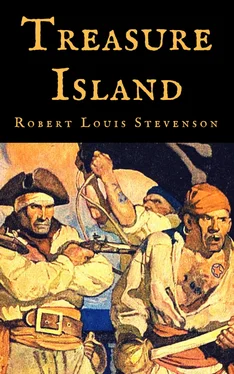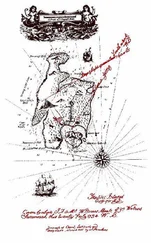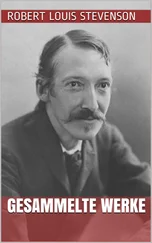Title Page TREASURE ISLAND by Robert Louis Stevenson To S.L.O., an American gentleman in accordance with whose classic taste the following narrative has been designed, it is now, in return for numerous delightful hours, and with the kindest wishes, dedicated by his affectionate friend, the author. TO THE HESITATING PURCHASER If sailor tales to sailor tunes, Storm and adventure, heat and cold, If schooners, islands, and maroons, And buccaneers, and buried gold, And all the old romance, retold Exactly in the ancient way, Can please, as me they pleased of old, The wiser youngsters of today: —So be it, and fall on! If not, If studious youth no longer crave, His ancient appetites forgot, Kingston, or Ballantyne the brave, Or Cooper of the wood and wave: So be it, also! And may I And all my pirates share the grave Where these and their creations lie!
PART ONE—The Old Buccaneer
1 The Old Sea-dog at the “Admiral Benbow”
2 Black Dog Appears and Disappears
3 The Black Spot
4 The Sea-chest
5 The Last of the Blind Man
6 The Captain's Papers
PART TWO—The Sea-cook
7 I Go to Bristol
8 At the Sign of the Spy-glass
9 Powder and Arms
10 The Voyage
11 What I Heard in the Apple Barrel
12 Council of War
PART THREE—My Shore Adventure
13 How My Shore Adventure Began
14 The First Blow
15 The Man of the Island
PART FOUR—The Stockade
16 Narrative Continued by the Doctor: How the Ship Was Abandoned
17 Narrative Continued by the Doctor: The Jolly-boat's Last Trip
18 Narrative Continued by the Doctor: End of the First Day's Fighting
19 Narrative Resumed by Jim Hawkins: The Garrison in the Stockade
20 Silver's Embassy
21 The Attack
PART FIVE—My Sea Adventure
22 How My Sea Adventure Began
23 The Ebb-tide Runs
24 The Cruise of the Coracle
25 I Strike the Jolly Roger
26 Israel Hands
27 “Pieces of Eight”
PART SIX—Captain Silver
28 In the Enemy's Camp
29 The Black Spot Again
30 On Parole
31 The Treasure-hunt—Flint's Pointer
32 The Treasure-hunt—The Voice Among the Trees
33 The Fall of a Chieftain
34 And Last
Imprint
TREASURE ISLAND
by Robert Louis Stevenson
To S.L.O., an American gentleman in accordance with whose classic taste the following narrative has been designed, it is now, in return for numerous delightful hours, and with the kindest wishes, dedicated by his affectionate friend, the author.
TO THE HESITATING PURCHASER
If sailor tales to sailor tunes,
Storm and adventure, heat and cold,
If schooners, islands, and maroons,
And buccaneers, and buried gold,
And all the old romance, retold
Exactly in the ancient way,
Can please, as me they pleased of old,
The wiser youngsters of today:
—So be it, and fall on! If not,
If studious youth no longer crave,
His ancient appetites forgot,
Kingston, or Ballantyne the brave,
Or Cooper of the wood and wave:
So be it, also! And may I
And all my pirates share the grave
Where these and their creations lie!
1 The Old Sea-dog at the “Admiral Benbow”
SQUIRE TRELAWNEY, Dr. Livesey, and the rest of these gentlemen having asked me to write down the whole particulars about Treasure Island, from the beginning to the end, keeping nothing back but the bearings of the island, and that only because there is still treasure not yet lifted, I take up my pen in the year of grace 17 and go back to the time when my father kept the Admiral Benbow inn and the brown old seaman with the sabre cut first took up his lodging under our roof.
I remember him as if it were yesterday, as he came plodding to the inn door, his sea-chest following behind him in a hand-barrow—a tall, strong, heavy, nut-brown man, his tarry pigtail falling over the shoulder of his soiled blue coat, his hands ragged and scarred, with black, broken nails, and the sabre cut across one cheek, a dirty, livid white. I remember him looking round the cover and whistling to himself as he did so, and then breaking out in that old sea-song that he sang so often afterwards:
“Fifteen men on the dead man's chest—
Yo-ho-ho, and a bottle of rum!”
in the high, old tottering voice that seemed to have been tuned and broken at the capstan bars. Then he rapped on the door with a bit of stick like a handspike that he carried, and when my father appeared, called roughly for a glass of rum. This, when it was brought to him, he drank slowly, like a connoisseur, lingering on the taste and still looking about him at the cliffs and up at our signboard.
“This is a handy cove,” says he at length; “and a pleasant sittyated grog-shop. Much company, mate?”
My father told him no, very little company, the more was the pity.
“Well, then,” said he, “this is the berth for me. Here you, matey,” he cried to the man who trundled the barrow; “bring up alongside and help up my chest. I'll stay here a bit,” he continued. “I'm a plain man; rum and bacon and eggs is what I want, and that head up there for to watch ships off. What you mought call me? You mought call me captain. Oh, I see what you're at—there”; and he threw down three or four gold pieces on the threshold. “You can tell me when I've worked through that,” says he, looking as fierce as a commander.
And indeed bad as his clothes were and coarsely as he spoke, he had none of the appearance of a man who sailed before the mast, but seemed like a mate or skipper accustomed to be obeyed or to strike. The man who came with the barrow told us the mail had set him down the morning before at the Royal George, that he had inquired what inns there were along the coast, and hearing ours well spoken of, I suppose, and described as lonely, had chosen it from the others for his place of residence. And that was all we could learn of our guest.
He was a very silent man by custom. All day he hung round the cove or upon the cliffs with a brass telescope; all evening he sat in a corner of the parlour next the fire and drank rum and water very strong. Mostly he would not speak when spoken to, only look up sudden and fierce and blow through his nose like a fog-horn; and we and the people who came about our house soon learned to let him be. Every day when he came back from his stroll he would ask if any seafaring men had gone by along the road. At first we thought it was the want of company of his own kind that made him ask this question, but at last we began to see he was desirous to avoid them. When a seaman did put up at the Admiral Benbow (as now and then some did, making by the coast road for Bristol) he would look in at him through the curtained door before he entered the parlour; and he was always sure to be as silent as a mouse when any such was present. For me, at least, there was no secret about the matter, for I was, in a way, a sharer in his alarms. He had taken me aside one day and promised me a silver fourpenny on the first of every month if I would only keep my “weather-eye open for a seafaring man with one leg” and let him know the moment he appeared. Often enough when the first of the month came round and I applied to him for my wage, he would only blow through his nose at me and stare me down, but before the week was out he was sure to think better of it, bring me my four-penny piece, and repeat his orders to look out for “the seafaring man with one leg.”
How that personage haunted my dreams, I need scarcely tell you. On stormy nights, when the wind shook the four corners of the house and the surf roared along the cove and up the cliffs, I would see him in a thousand forms, and with a thousand diabolical expressions. Now the leg would be cut off at the knee, now at the hip; now he was a monstrous kind of a creature who had never had but the one leg, and that in the middle of his body. To see him leap and run and pursue me over hedge and ditch was the worst of nightmares. And altogether I paid pretty dear for my monthly fourpenny piece, in the shape of these abominable fancies.
Читать дальше












